- TOP
- Prospective Students
- Campus Life
- Student Dormitories
Student Dormitories
Updated on May 10 2025
New students coming from places other than the Kanto region feel as much anxiety as they do anticipation for their new lives. Please consider living in the university dormitory or a designated dormitory in addition to a private apartment or condominium.
Dormitory “Tokiwagi”
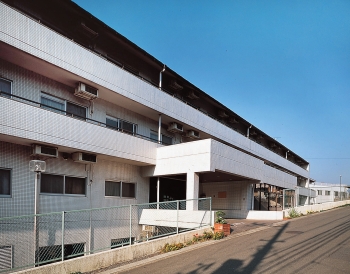
Kokugakuin University’s new women’s dormitory, the “Tokowagi dormitory” opened in April 2016, in Aoba-ku of Yokohama City.
In principle, the dormitory accepts female students whose parents’ homes are outside Tokyo, Kanagawa Prefecture, Saitama Prefecture, and Chiba Prefecture.
The University provides the dorm residents a good living environment, which promotes interaction with classmates as well as their senior and junior students, and reduces the worries of students who begin to live on their own away from their parents for the first time. Furthermore, this women’s dormitory helps residents learn the basic skills for required for members of society through both university and dormitory life, and at the same time fosters global talents that are equipped with different skills, including acquiring language (English) skills.
This dormitory is located in a place, which is eight minutes by foot from Eda Station on the Tokyu Denentoshi Line, which is convenient for accessing both the Shibuya campus and the Tama Plaza campus.
Women’s dormitory outline
- Address: 434-1 Eda-cho, Aoba-ku, Yokohama City
- Commuting time to campus: About 50 minutes to the Shibuya campus, and about 18 minutes to the Tama Plaza campus
- Transportation access: 8-minute walk from Eda Station on the Tokyu Denentoshi Line
- Building and area: Steel reinforced concrete, 5 stories
- Dormitory capacity: 116 people in single-occupancy rooms (15.17㎡/room)
- Management: Managed by a live-in married couple custodian
- Security: Auto-lock, security cameras
- Shared facilities: cafeteria, study room, conference room, bath room, shower room, laundry room, mini-kitchen, microwave, shoes box, collective mailbox
- Individual room furnishings: bed, desk, chair, closet, TV antenna terminal, Internet, shoes box
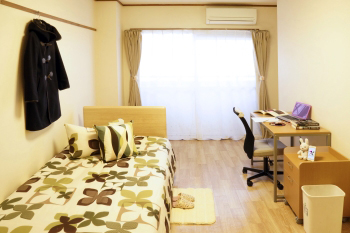
Image of living space
Dormitory system
A dormitory mentor provides support.
A dormitory mentor is a role taken by a staff member who supports students living in a dormitory so that they can live a meaningful life there. Female staff members from sections specialized in international exchanges (languages), career support, and student life (dormitory life) of the University will lead residents to growth in their dormitory lives in each field.
Resident Leaders (RL) support dormitory residents.
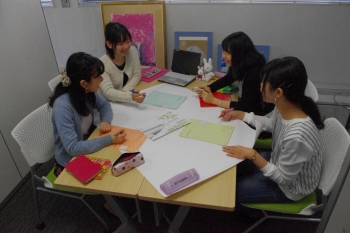
Resident Leaders (RL) are student leaders who support dormitory residents’ daily life so that students who have left their parents’ home can live pleasantly and with peace of mind. Those seniors who were strictly selected by the University and received training live in the dormitory as a RL. They support dormitory residents’ life by offering consultation and advice on daily life in the dormitory, on studies and on extracurricular activities, based on their own experiences.
Nourishing an international awareness and foundations for becoming members of society.
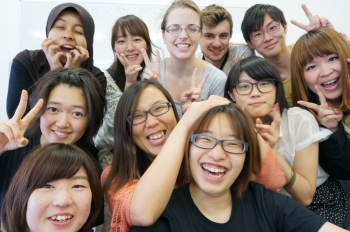
■ Fostering global talents
Acquiring language skills is essential for people in a globalizing society. This dormitory has introduced an extracurricular learning program to improve language skills provided separately from regular classes. In addition, we foster global talents who can make their own way in society by living with exchange students whose religious and cultural backgrounds are different to that of the residents.
■Improving social basic skills
The concept of social basic skills proposed by the Ministry of Economy, Trade and Industry refers to three abilities, namely the “ability to step forward,” the “ability to think things through,” and the “ability to work as a team.” This dormitory has its own career support program to foster talents currently sought by society to enable dormitory residents to acquire these skills through dormitory life and while they are students.
Application
※Please see the guide for entering the dormitory or dormitory application requirements for details.
Conditions for entering dormitory
- In principle, applicants must be female students who are not commuting to the university from their parents’ home in a prefecture other than the Tokyo Metropolitan area and surrounding three prefectures (Tokyo, Kanagawa Prefecture, Saitama Prefecture, and Chiba Prefecture).
- In principle, applicants must be a 1st or 2nd year student. However, 3rd year students who wish to live in the dormitory may be allowed through a selection.
New students (※ Who meet the condition 1 for entering dormitories)
【Persons having completed entrance procedures for recommendations based and special selection】
The “Dormitory Guide” will be sent out in early February 2016. Those who wish to apply should carefully read the “Dormitory Application Requirements” that is also enclosed. After filling in all the required information in the application, send it to the Student Affairs Office listed at the end of the document. Following this, applications will be screened and interviews take place to decide.
【Those who passed the A Schedule, V Method (1st Term)】
The “Dormitory Guide” will be sent to those who pass the A Schedule, V Method (1st Term). Those who wish to apply should carefully read the “Dormitory Application Requirements” that is also enclosed. After filling in all the required information in the application, send along with the secondary procedure (final) documentation. After that, applications are screened and interviews take place to decide.
【Those who passed the B Schedule, V Method (2nd Term)】
The “Dormitory Guide” will be sent along with the notification of passing the entrance examination. Those who wish to apply should carefully read the “Dormitory Application Requirements” that is also enclosed. After filling in all the required information in the application, send it along with the University entrance process documents. After that, applications are screened and interviews take place to decide.
※Please note that in some cases no applications may be invited for the V method (2nd term) because selection takes place from the entrance examination methods that release the pass results earlier than the V method.
Current students (current 1st and 2nd year students)
Applications from those wishing to live in the dormitory are received and selected from early February 2016.
Application period: February 1 to February 10, 2016 (planned)
Interviews and dormitory visits: February 17, 2016
※“Dormitory Application Requirements” are available to those wishing to live in the dormitory at the Student Affairs Office from the mid-January 2016.
【Information sessions for entering the dormitory】
Information sessions for current students about entering the dormitory are conducted as follows.
Those who are interested are encouraged to participate in. You may bring your lunch.
First session: January 20, 2016, (Wednesday) 12:10 to 12:40, Room 2403
Second session: January 21, 2016, (Thursday) 12:10 to 12:40, Room 2503
January 22, 2016 (Friday), 12:15 to 12:45, 5th conference room
【Dormitory fees, etc.】
Dormitory fee: ¥70,000
Meal charge: ¥16,800 (Including 2 meals per day, breakfast and dinner, except for Saturdays, Sundays and holidays)
Utilities: Included in dormitory fees
【Dormitory rules】
Dormitory rules are currently being drafted.
As soon as they are complete, they will be posted on this page.
【Inquiry】
Shibuya Campus, Student Affairs Office, Student Affairs Division
Higashi 4-10-28, Shibuya-ku, Tokyo 150-8440
Telephone: 03-5466-0145
E-Mail:gakusei_s@kokugakuin.ac.jp
※However, the office is closed on Sundays and holidays.
【Access map】
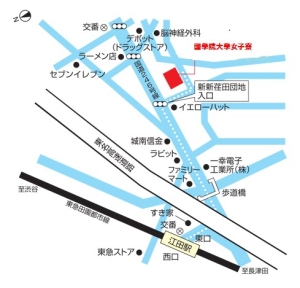
Designated dormitories
- Dormy Sakura-shinmachi
- Dormy Miyazakidai
- Dormy Musashi Kosugi
- Dormy Miyazakidai-minami
Contact: Public Relations Office
RECOMMENDS
-
{{settings.title}}
{{settings.lead.title}}
{{{settings.lead.letter}}}
{{pages.title}}
{{articles.title}}
Language
SEARCH
{{section.title}}
-
{{item.tagline}}

